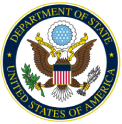The first day of the Go Viral festival dedicated to creative economy and networking comes to the end in Osh. The event gathered over 700 participants as well as cool specialists of media, business, culture and technology.
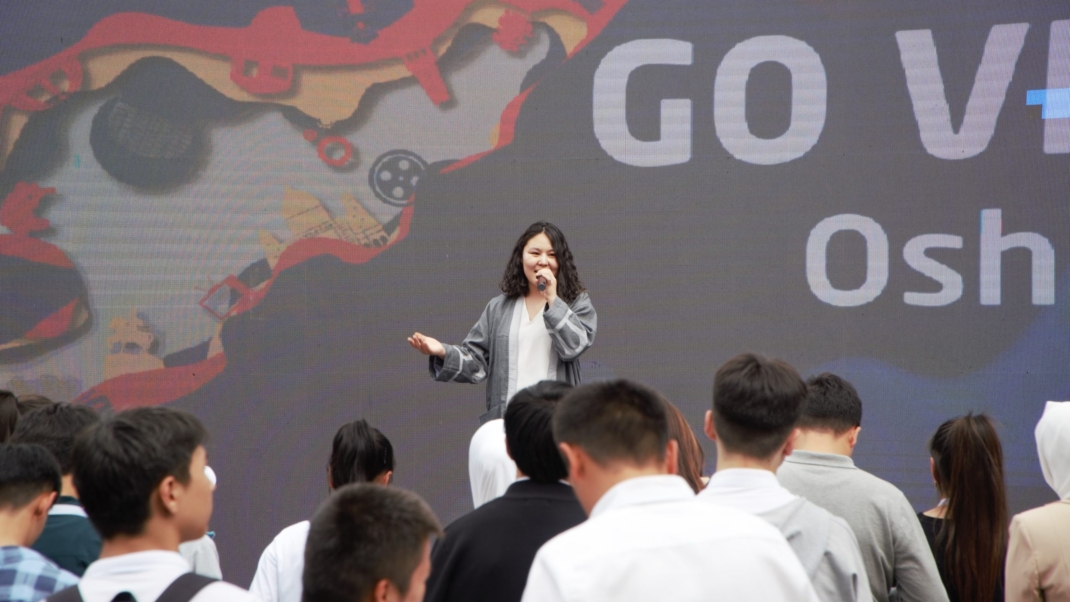
Go Viral is the annual regional festival held in five countries of Central Asia. This year is special because Osh, instead of Bishkek, took the baton from Tashkent (Uzbekistan). Thus, the unique place for networking and sharing experience for personal and professional development was created for modern, creative youth in the southern capital.
On the first day, participants discussed prospects of art in the digital age, the future of work in the world controlled by technologies, challenges caused by artificial intelligence development. They also spoke about the path to the world of business and IT, the balance between development and preservation of nature.
The first Go Viral festival took place in Almaty in 2017. For five years, it has developed from a three-day event to the regional community of representatives of media, business, culture and technology in five Central Asian states. The project is sponsored by the Department of State with the support of the U.S. diplomatic missions in Central Asia. The project has been implemented by the Institute for War&Peace Reporting (IWPR) in Central Asia since October 2021.
The Osh-based festival was visited by the U.S. ambassador to Kyrgyzstan, Leslie Viguerie. He noted that the biggest potential in economy lies in the creativity, education and resourcefulness of the Kyrgyz people.
“Today, gold is not under ground, it’s among the people – it’s your ideas, talent, and energy. You are creating the future economy of the country and link it to the global market. For us, the U.S., one of possible ways to support you is to provide assistance to such initiatives as Go Viral,” the ambassador said.
According to Begaiym Adzhikeeva, programme manager of the Institute for War&Peace Reporting (IWPR), the emphasis is made on tourism and agriculture, while discussions about the use of these sectors for economic development and creation of dynamic communities will be the main topic.
“I am calling everyone to grow you network and use it for education, professional growth. Let’s find answers to relevant and motivating questions together with like-minded people and look for ways to solve local issues, to expand our community,” said Adzhikeeva.
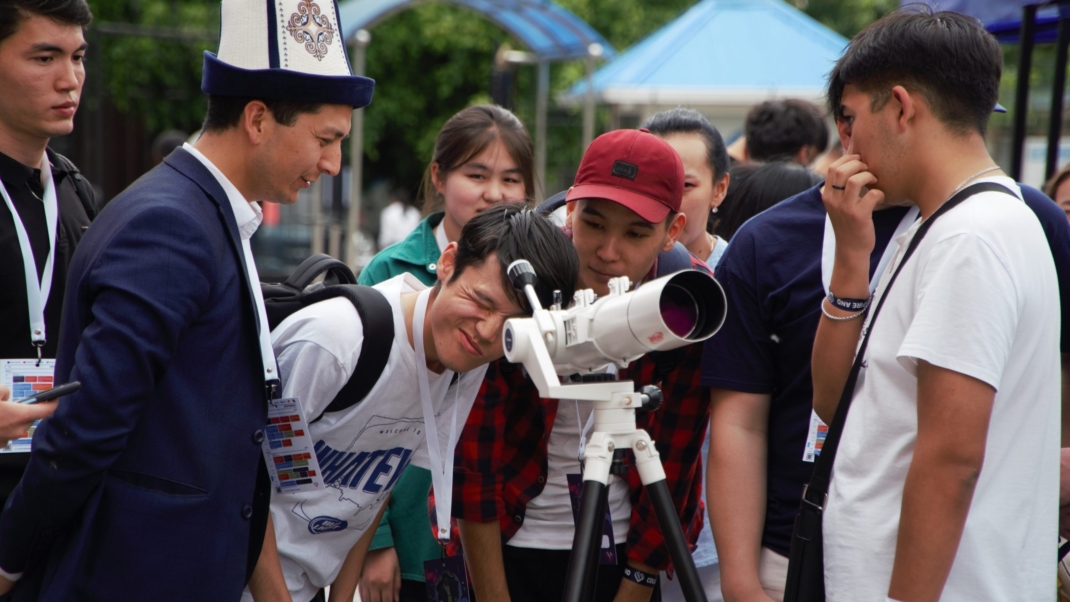
Youth is concerned with education in the U.S.A.
U.S. Ambassador to Kyrgyzstan Leslie Viguerie held an “unofficial dialogue” with participants. The students were interested in a wide range of questions: from secrets of diplomatic career to opening business in the U.S. Most questions were about getting education in the United States. The ambassador not only answered the questions, but also shared resources, sources and centres that would show them the way to seek opportunities in the U.S.
The blogger ‘English apake’, known in the country, Barchynai Omarbek kyzy, is planning to open English language course in the village. She asked the ambassador to provide resource support, namely to send native speakers to remote places. Another participant’s question was in the same field: which projects are intended for Osh?
According to Leslie Viguerie, methodical support will be provided soon to the teachers of Osh. Also, volunteers who teach not only English, but also other skills, will probably be sent to regions.
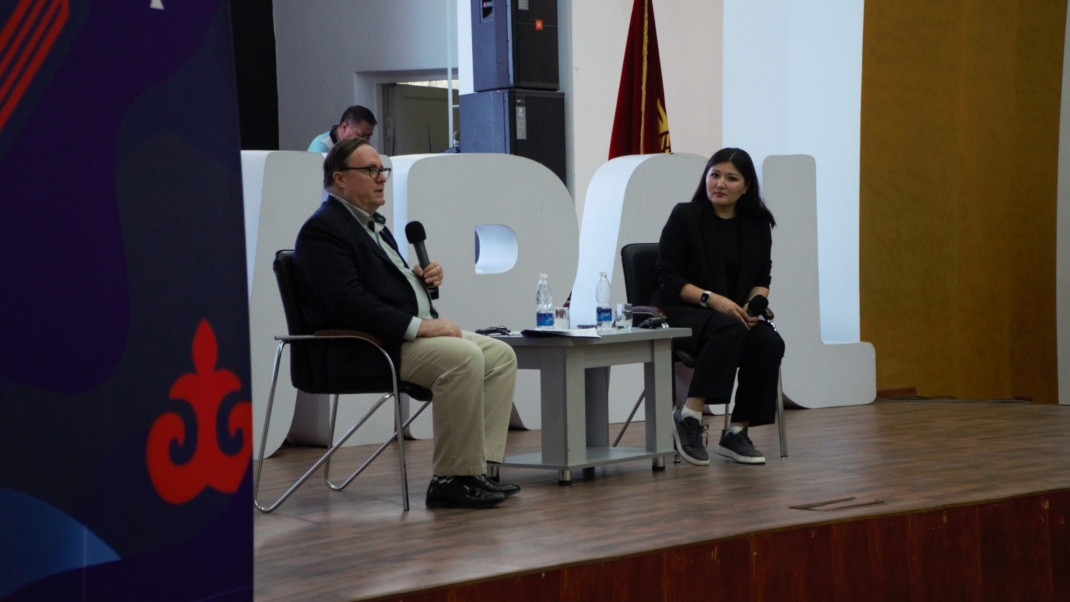
Obstacles in your head, not outside
The conversation with the special guest, Aisha Bowe, became the most vivid part of the festival. Aisha Bowe is a former NASA rocket scientist (National Aeronautics and Space Administration), global motivational speaker, and the founder and CEO of STEMBoard, an engineering powerhouse recognised in the Inc. 5000 as one of the fastest-growing companies in America. She will soon go down in the history of space exploration as the first black woman-astronaut. Bowe is also a passionate advocate of women’s and girls’ rights in science, technology, engineering and math (STEM) and inspires others to make their dreams come true and reach for the stars.
“In my environment, there have never been any relatives or acquaintances related to NASA. I’ve decided to go to this sphere myself. I believed in myself. Of course, I feared everything at first. But I believed that I could build a vivid life via education. If you want to reach your goals, try all the ways – both possible and impossible,” she said.
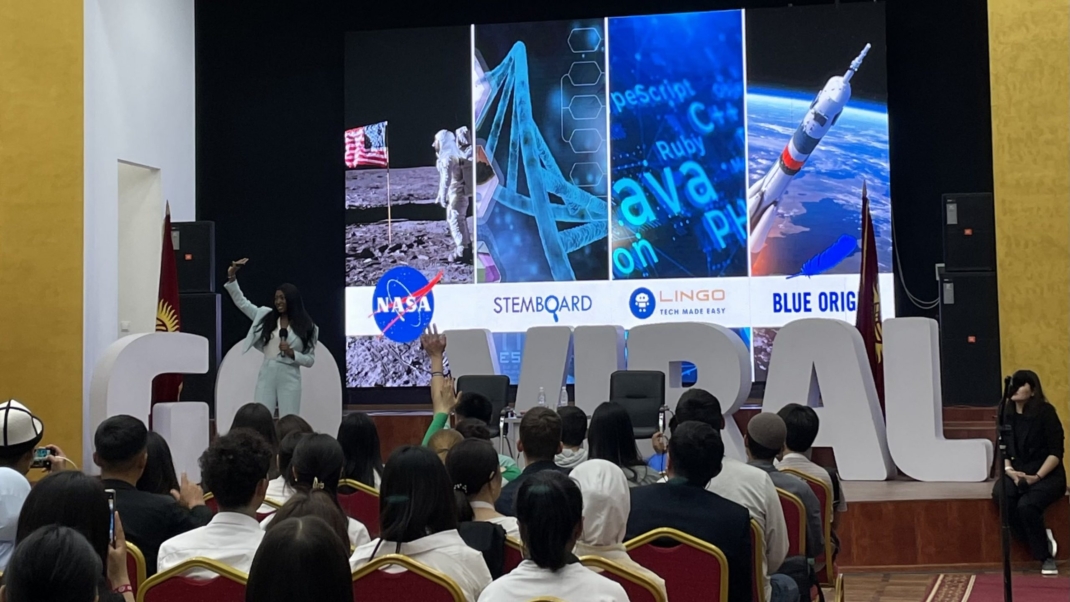
Ten years ago, Aisha Bowe founded her business in IT, which she started without anyone’s assistance, experience, accumulating capital in her main job. According to her, first success happened four years after the company was founded and today they have over a hundred of branch offices.
“Nothing comes easy. If you start your business after analysing, you will surely reap the fruits in five years. We should share our successes with each other, we should learn from each other. The main obstacle is thoughts in our head. If you think you wouldn’t succeed, you won’t succeed. An entrepreneur must think positively, let yourself make mistakes. Expand your network, it will be useful,” the speaker said.
She also said about the role of social media and content in running a business. Aisha Bowe promised to return to Kyrgyzstan after space exploration and share her new inspiring experience.
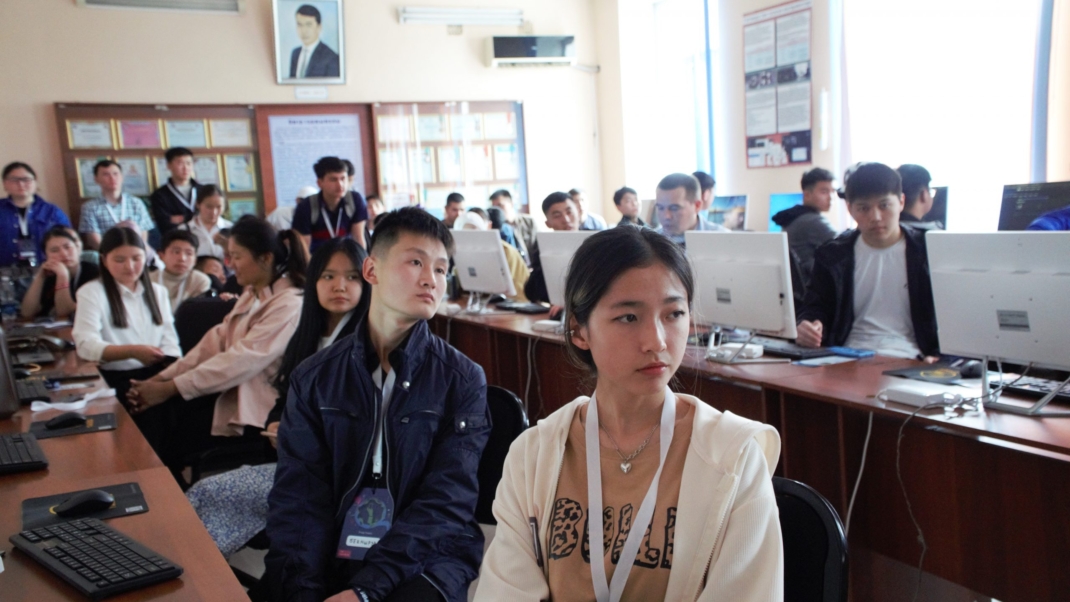
Don’t be afraid of copying someone else’s business
Copying a business is a normal thing, but creativity cannot be reproduced. This is the keynote of the panel discussion “Thin line: Research of business imitation limitations.” The participants were Sardor Salimov, founder of KIYIZGROUP, Tumar Ibraimov, photographer, director and founder of Metr Group, Merri Garden Qaarman, Zhazgul Zhunusbaeva, entrepreneur in commerce, consulting and logistics, and Bakhram Rakhmankulov, who develops start-ups in Fergana Valley.
Sardor Salimov believes it is fundamentally important to develop modern entrepreneurship in Kyrgyzstan, to increase the number of modern businessmen.
“Modern businessmen are the people who generate great ideas, have their values. At the same time, copying ideas is a normal phenomenon in business practice. Everyone’s copying in the world and it is considered appropriate. As they say, the world is changing, champions are changing. You only have to make your first step towards championship and try to differ by your creativity, ambitiousness,” he said.
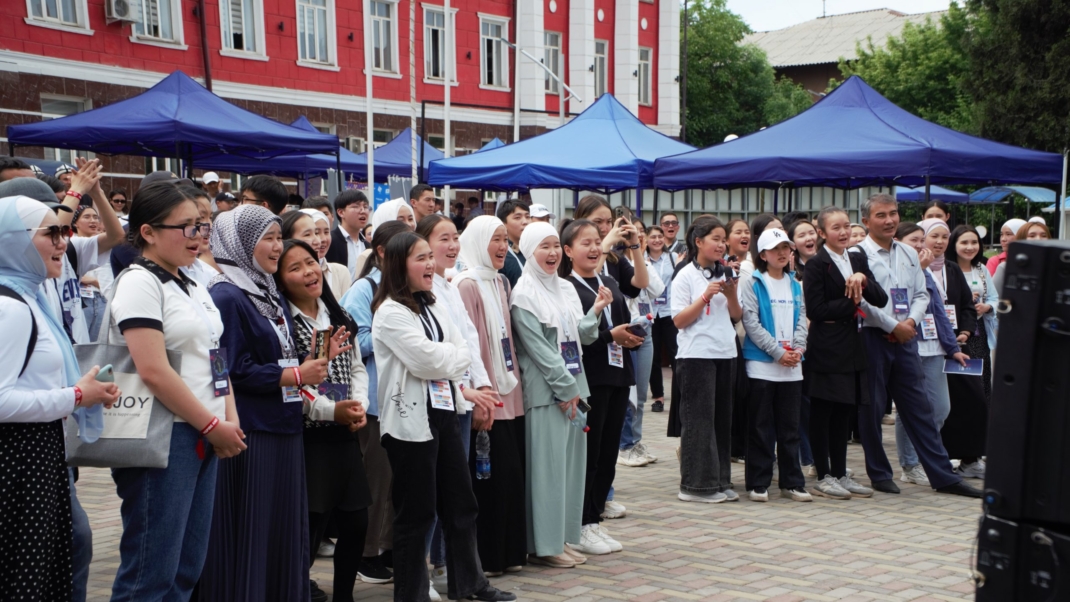
Zhazgul Zhunusbaeva also called the youth to not to restrain themselves saying that all niches in business are occupied.
“For example, four women in a village applied for a grant to international organisations and all of them had the same idea – to open a poultry farm. They can get together and write one project. Each of them has different thinking, different methods and strengths. Business ideas can be similar, yet will have their own special things and peculiarities,” Zhunusbaeva said.
The session by Nuripa Faizieva, founder of By Alay, was in tune with the points specified during the panel discussion. According to her, there are many people in Kyrgyzstan who produce ethnic products. They could stand out and take their position in the market due to branding.
“We have thought a lot of time how we could differ from our rivals, and finally we ended up with branding. When we make the dowry and articles, we attach our labels. To attract customers, we give our handmade bags and souvenirs at various events and try to participate in international exhibitions. We want the world know about our items created with mother’s love,” the speaker shared her experience.
Artificial intelligence: a possibility or a threat?
The question of global concern was raised in every session because artificial intelligence penetrates into all spheres of life. Data journalist Altynai Mambetova prepared a presentation on the topic “BOOST AI: How to use artificial intelligence to boost your efficiency in work?”.
“A person can benefit from artificial intelligence. For example, voice assistants Alisa, Siri, they are AI. There are two camps regarding this issue. The first one considers it the threat, which will take people’s jobs. And the second one use AI actively and create fairy things. I am from the second camp. If we use it the right way, our life will get easier,” Mambetova said.
The journalist said that people need to speak to artificial intelligence correctly and ask correct questions.
Abdulkadyr Musa uulu, general manager of Osh-based branch of IT Academy, does not refute the fact that artificial intelligence replaces specialists in his sphere to some extent. But one should never give up on one’s dream referring to this fact. No matter how deep technologies get into our life, everything is still managed by a man, it is absolutely impossible to replace the human’s mind and hands in full, he said.
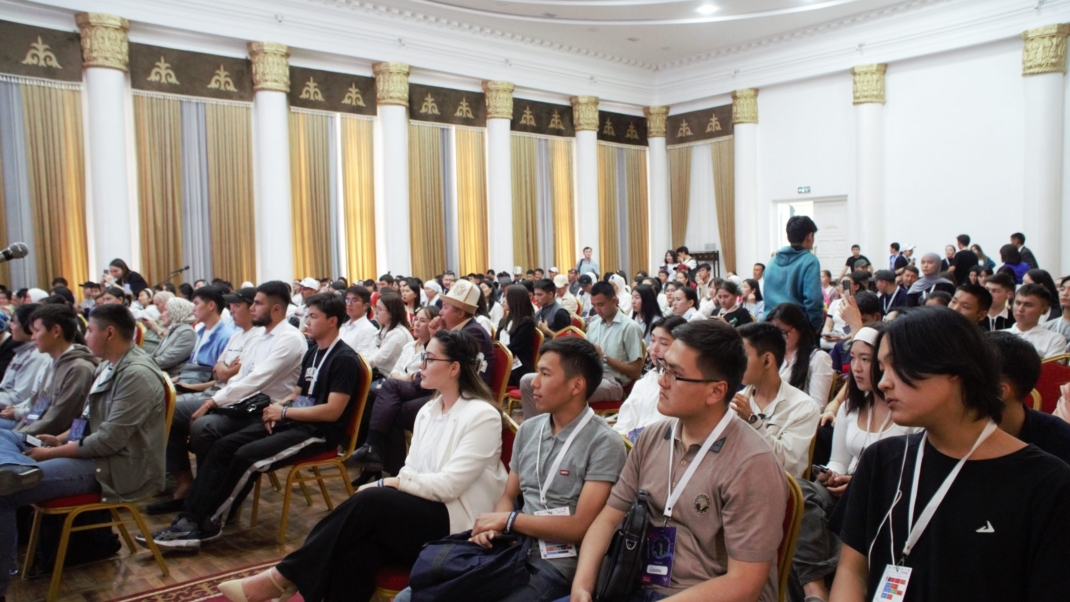
Representatives of the academy, Edzen Oichiev and Kairat Kurbanaliev, said about a smoother entry to the IT world, shared their experiences in backend development, emphasised the fundamentals of HTML, CSS and JavaScript. The audience asked about the language barrier in this profession, and asked the traditional question, “it is better to study in the university or attend courses,” they were also interested in the competitiveness of artificial intelligence compared to IT specialists.
According to Edzen Oichiev, such festivals and platforms give an opportunity to provide quality information and quality institutions, courses, and also expand network.
“There are so many impostors now who say, ‘take a three-month course and start earning 1,000 dollars.’ This is not true. It can take at least 2-3 years to get such a pay, after hard work and gaining experience. One more important moment is that alumni of such courses without sufficient skills apply to foreign companies, and as a result the image of all Kyrgyzstan-based developers gets worse,” he said.
Speakers also dispelled stereotypes. For example, according to Oichiev, IT specialists are not people who sit behind their PCs 24/7 and communicate with no one. IT specialists also need to have soft skills, networking, expansion of connections and new acquaintances. “Connections matter,” he said.
Kairat Kurmanaliev, answering the questions of students, said that it is not necessary to be a good in mathematics for IT sphere.
“It’s not math, but creativity and imagination that matters. If ten of you get the task to solve a problem, they all write different codes,” Kurmanaliev said.
From traditional to digital: how artistic skills transformed
Digitalisation has brought new possibilities and challenges to the traditional art. Artist Tatiana Zelenskaya shared her thoughts on this topic, and emphasised the key moments of the long way of art development: from the history of development to multimodal neural networks. She calmed down the audience: artificial intelligence will not replace creativity.
“I am interested in creativity, art, so I came here specifically to attend Tatyana’s session. I am an UX/UI designer. The lecture was very meaningful. She said that we should not fear that AI would replace us. She shared her vision of digitalisation of art. The selection of the lecturer created by means of artificial intelligence was the most memorable,” said one of participants, Aidai Daniyar kyzy.
Baktygul Midinova, director of the T.Sadykov Osh regional museum of fine arts, noted that globalisation, development of technologies have re-opened doors to museum studies and much interest is given to local history.
“We should open compact museums locally, which should have reliable, interesting information about exhibits, local history. We have learned that by example of the museum in the village of Sary-Mogol, Alai district. No matter how digitalisation, civilisation develop, identity and distinctiveness will always be valued,” the expert said.
The first day of the festival filled with useful insights and meetings ended up with a pleasant music performance. Tamga and others performed for participants. Today will be the second day, which promises to be as intensive in terms cool speakers and topics as the previous one.
